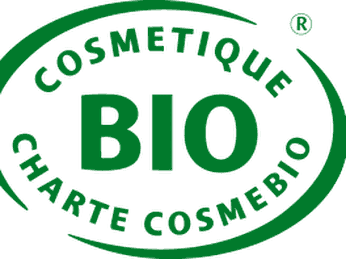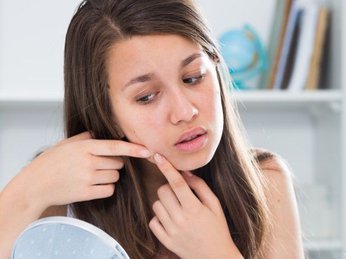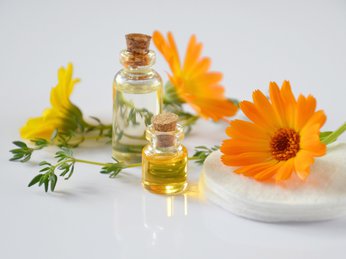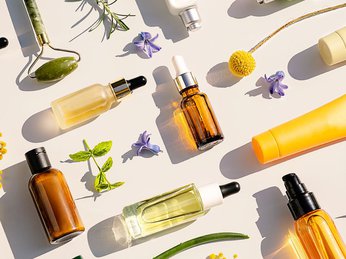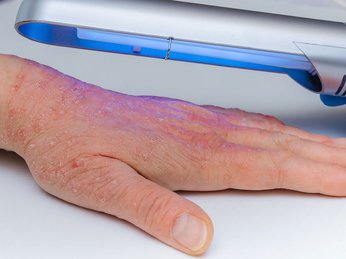Should You Be Using Micellar Water in Your Skin-Care Routine?
Micellar water is affordable, easy to use, and promises to be gentle on the skin. But does micellar water really live up to its hype?
As a first step in your skin-care routine, micellar water helps gently cleanse skin.
You’re great at remembering to cleanse your skin each night, and yet after dabbing your face dry, you notice makeup stains on your towel. Enter: micellar water.
Micellar (pronounced “MY-sell-er”) water is a combination of purified water and hydrating ingredients such as glycerin, along with low concentrations of extremely mild surfactants or soaps called micelles, says Gretchen Frieling, MD, a Boston-based dermatopathologist. These micelles attract and capture dirt and oil, so when you rub the micellar water off your skin, impurities are lifted out and the hydrating elements keep skin moisturized.
This combination was the brainchild of Parisians, Dr. Frieling says, because the city’s water is notoriously harsh on the skin, to the point of causing breakouts. Because micellar water doesn’t need to be rinsed off, it became an effective way to clean skin — and especially to remove makeup — without using tap water.
How Micellar Water Works, Especially in a Double-Cleanse Regimen
After becoming a go-to product for makeup artists and celebrities in France, micellar water went global a few years ago, showing up in products from L’Oréal, Kiehl’s, and Olay, among many others, Frieling says. The product also got a boost by becoming a popular option for the Korean double cleansing method, which involves first using an oil-based cleanser or micellar water to remove makeup, oil, and dirt, and then using a second, water-based cleansing step.
According to the American Academy of Dermatology, this gentle-cleansing process can be effective for preventing breakouts and treating acne. That’s because micellar water, followed by another cleanser — even soap and water — not only removes the bad stuff, but it also releases the good stuff — namely, sebum, which the skin produces as a natural moisturizer.
When dead skin cells, as well as dirt and oil, build up at the pore’s opening, the sebum will not be able to leave the pore, says Frieling. “It then builds up in the sebaceous gland, which leads to the development of a whitehead or blackhead,” she says. “When this becomes inflamed, it turns into a pimple. Because micellar water helps clear your pores, it can lessen the chances of this happening. And it doesn’t leave oily residue behind.
For more makeup tools, Explore style from Linda Rodyn
Micellar Water Can Be Gentle on the Skin — Depending on the Ingredients
One of the most notable aspects of micellar water is how gentle it is on the skin, compared with other cleansers, according to Tien Nguyen, MD, a dermatologist at MemorialCare Orange Coast Medical Center in Fountain Valley, California.
“It’s simply a great product, especially for those with sensitive skin or who have had issues with other cleansers,” he says. “If you’re seeing any negative reaction, it’s most likely because of some added ingredient that’s causing a problem. But basic, simple micellar water is suitable for all skin types.”
The biggest culprits for irritation are alcohol, parabens, sulfates, synthetic fragrances, and dyes, he says. Fortunately, there are numerous options with simple formulations that don’t include these type of ingredients, Dr. Nguyen adds.
According to a study on cleanser formulations, micellar water is compatible with the skin because it removes surface dirt, oil, and makeup without compromising the skin barrier, unlike more aggressive cleansers, the researchers suggest, which put the integrity of the skin’s structure at risk.
Maintaining the skin barrier is particularly important for those with sensitive skin, according to another study, published in June 2017 in the Journal of the American Academy of Dermatology. Researchers singled out micellar water for providing cleansing and moisturizing effects — which in this study lasted about two hours — and a low risk of irritation.
“Because of its gentleness, micellar water can be used on skin with rosacea, eczema, or psoriasis, but if you have these skin conditions, it’s still best to check with your doctor before using it,” says Frieling.
How to Use Micellar Water in Your Skin-Care Routine
Pump the micellar water onto a cotton ball or cotton pad and lightly swipe or dab dirt and makeup away. There should be no oily residue, and no need to rinse with water — unless you’re doing a double cleanse.
Nguyen recommends keeping a small bottle handy in your bag, since it’s perfect for reapplying makeup during the day, and also makes a great post-workout facial cleanser.
He adds that the same goes for cleansing your face between sunscreen applications, which is helpful for making sure multiple sunscreen layers aren’t clogging your pores while they block the sunlight. Also, Nguyen says, this kind of quick cleaning may make your sunscreen more effective, because you won’t be putting it on over a sweaty face at the beach — sweat accumulation can “wash off” sunscreen faster, he says.
The way that it works on skin also comes in handy for cleaning makeup brushes, adds Frieling. She says, “This is the easiest, cheapest, and most fuss-free way to get your brushes clean. Just soak them in a bowl of micellar water for a few minutes, then dry with a paper towel or soft cloth.”
Everyday Health


